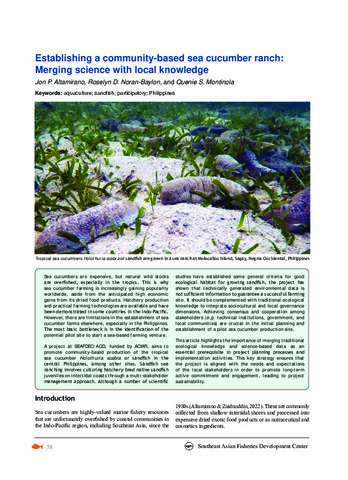Establishing a community-based sea cucumber ranch: Merging science with local knowledge
- Global styles
- MLA
- Vancouver
- Elsevier - Harvard
- APA
- Help
Share
นามธรรม
Sea cucumbers are expensive, but natural wild stocks are overfished, especially in the tropics. This is why sea cucumber farming is increasingly gaining popularity worldwide, aside from the anticipated high economic gains from its dried food products. Hatchery production and practical farming technologies are available and have been demonstrated in some countries in the Indo-Pacific. However, there are limitations in the establishment of sea cucumber farms elsewhere, especially in the Philippines. The most basic bottleneck is in the identification of the potential pilot site to start a sea-based farming venture.
A project at SEAFDEC/AQD, funded by ACIAR, aims to promote community-based production of the tropical sea cucumber Holothuria scabra or sandfish in the central Philippines, among other sites. Sandfish sea ranching involves culturing hatchery-bred native sandfish juveniles on intertidal coasts through a multi-stakeholder management approach. Although a number of scientific studies have established some general criteria for good ecological habitat for growing sandfish, the project has shown that technically generated environmental data is not sufficient information to guarantee a successful farming site. It should be complemented with traditional ecological knowledge to integrate sociocultural and local governance dimensions. Achieving consensus and cooperation among stakeholders (e.g. technical institutions, government, and local communities) are crucial in the initial planning and establishment of a pilot sea cucumber production site.
This article highlights the importance of merging traditional ecological knowledge and science-based data as an essential prerequisite in project planning processes and implementation activities. This key strategy ensures that the project is aligned with the needs and expectations of the local stakeholders in order to promote long-term active commitment and engagement, leading to project sustainability.
Subjects
Sea cucumbersการอ้างอิง
Altamirano, J., Noran-Baylon, R. D., & Montinola, Q. S. (2024). Establishing a community-based sea cucumber ranch: Merging science with local knowledge. Fish for the People , 22(1), 38-43. http://hdl.handle.net/20.500.12066/7484
Type
magazineArticleคอลเลกชัน
- Fish for the People [37]
Related items
Showing items related by title, author, creator and subject.
-
Series: ACIAR Proceedings; No. 136
Overview of sea cucumber aquaculture and sea-ranching research in the South-East Asian region
Mills, David J.; Duy, Nguyen Dinh Quang; Juinio-Meñez, Marie Antonette; Raison, Christina M.; Zarate, Jacques M. (Australian Centre for International Agricultural Research, 2012)South-East Asia has traditionally been the global centre of production of tropical sea cucumbers for Chinese markets. Early research into culture methods took place outside this region, notably in India, the Pacific region ... -
The sea cucumber fishery in Palawan, Philippines
Jontila, Jean Beth S.; Monteclaro, Harold M.; Quinitio, Gerald F.; Santander-de Leon, Sheila Mae; Altamirano, Jon (高知大学大学院黒潮圏海洋科学研究科, 2018)This paper presents the nature of sea cucumber fishery in Palawan, Philippines with information on gathering practices, commonly traded species and secondary accounts on wild populations. Current issues on sea cucumber ... -
Series: NOAA technical memorandum; NMFS-F/SPO-168
Development of integrated multi-trophic aquaculture using sea cucumber
Watanabe, Satoshi; Kodama, Masashi; Sumbing, Joemel G.; Lebata-Ramos, Ma. Junemie Hazel (United States Department of Commerce, National Oceanic and Atmospheric Administration, National Marine Fisheries Service, 2017)
In Southeast Asian countries, aquaculture production continues to increase. Environmental deterioration associated with water and sediment eutrophication by aquaculture effluent has been problematic, sometimes resulting ...
(United States Department of Commerce, National Oceanic and Atmospheric Administration, National Marine Fisheries Service, 2017)
In Southeast Asian countries, aquaculture production continues to increase. Environmental deterioration associated with water and sediment eutrophication by aquaculture effluent has been problematic, sometimes resulting ...







